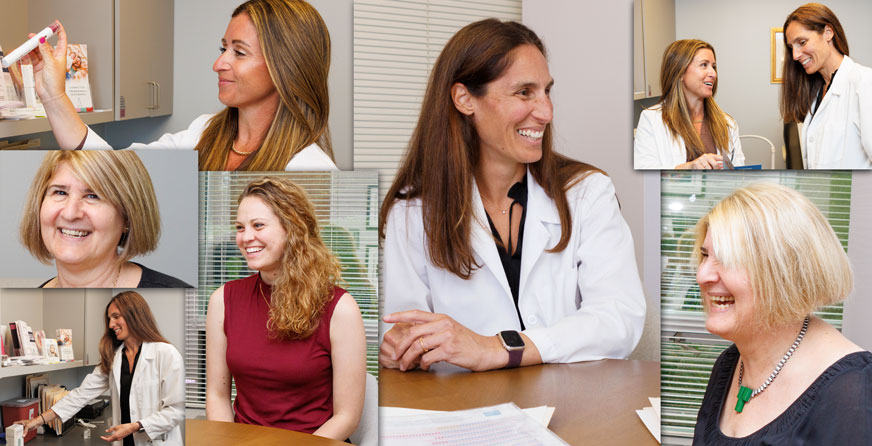
Sexual Dysfunction: It's Not all in Your Head
You may hear us say lots of things, but one thing you’ll never hear from us is, “It’s all in your head.” We take everything you tell us seriously. There is nothing you’re experiencing that we haven’t experienced here at Maze.
Our team members and physicians are specially trained in women’s sexual health and have treated thousands of women just like you. They’ll spend time discussing your sexual history, and other factors in your life that may be contributing to your particular dysfunction.
Don’t assume sex therapy is the only answer. There can be any number of reasons why you’re experiencing what you’re experiencing — some of those may be physiological (that is, physical) and some of those may be psychological. Often those two things may be affected by each other. After a thorough evaluation, we’ll help determine which is which and offer the proper treatment and solutions to help you.
You may be surprised how quickly obstacles to your sexual health and satisfaction can be removed and how easily sex can become a rewarding part of life for you and your partner.
Helpful Resources
SEXUAL DYSFUNCTION: IS IT REAL?
SEXUAL HEALTH ISSUES
Low Sex Drive
Hypoactive Sexual Desire Disorder (HSDD) is a deficiency or absence of sexual fantasies and desire for sexual activity. It is the diagnostic term for what we commonly know as low sex drive or low libido or just plain “not wanting to have sex”. There is currently a lot of press around HSDD as physicians, sexual health specialists, sex therapists and pharmaceutical companies debate the balance between physiological and psychological sources of low desire. Learn More
Arousal Disorders
There are physiological changes that take place in the body when we become sexually aroused. Most women describe themselves as “turned on” when they occur. There are subtle changes that we may not notice along with some that are more obvious. In some women the problem is that these physiological changes are not taking place. In other women changes may be taking place but they might not be aware of them. That is why the medical community has split arousal issues into two groups: “objective arousal,” arousal that we can measure (with proper equipment) and “subjective arousal” which is how the woman feels. Learn More
Orgasm
“Orgasm” is the word used to describe the intense sensation experienced at the peak of sexual excitement. Most women (hovering somewhere around 96%) can have orgasms. If you’re having difficulty experiencing orgasms, the new O-Shot treatment may be right for you. Learn More
Persistent Sexual Arousal Syndrome (PSAS)
Persistent Sexual Arousal Syndrome (PSAS), also known as Persistent Genital Arousal Disorder (PGAD), is a condition in which women experience a constant feeling of being sexually aroused and are unable to release it. It can be terribly debilitating and is often accompanied by depression or feelings of distress. Though it can happen to anyone, the condition most often strikes post-menopausal women in their 40s and 50s, those who have undergone hormonal treatment, or women who have recently started or discontinued antidepressants. Learn More
Sex Therapy
Sex therapy is a type of psychotherapy in which a licensed therapist works with an individual or couple on improving sexual functioning and satisfaction. Good sex therapy targets not only the behavioral symptoms but the emotions and feelings that may be creating a block to better sexual functioning. Sex therapy often includes sex some education and some discussion about toys and novelties that can enhance sexual pleasure as well. Learn More
Painful Sex
It is believed that 6 -12 % of women have vaginismus: a condition where there is involuntary tightness of the vagina during attempted intercourse. The tightness is actually caused by involuntary contractions of the pelvic floor muscles surrounding the vagina. The woman does not directly control or ‘will’ the tightness to occur; it is an involuntary pelvic response. She may not even have any awareness that the muscle response is causing the tightness or penetration problem. Learn More
Hormone Treatment
As we are becoming more aware of the fact that hormones may have a significant impact on women’s libidos, testosterone has begun to play a more important role in evaluation and treatment. For years research has supported the fact that testosterone replacement therapy in men significantly impacts libido, bone density, energy levels and mood. So practitioners experimented with small amounts of testosterone replacement in women and began to see significant and sometimes dramatic outcomes. Those of us in the field can tell you from our practical experience with thousands of patients with low libido: testosterone can and does work to raise a woman’s desire and interest in sex. Learn More
Sexual Health Inventory
The Sexual Health Inventory is a simple questionnaire to help you assess your general sexual health. Your interest in sex, ability to become aroused and incidence of pain during sex are indicators of sexual function and can help you reflect on the quality of your sex life. Of course, problems cannot be diagnosed by one questionnaire, but it might help you think about your sexual situation in a thoughtful way, and flag problems if you are having them. Learn More
